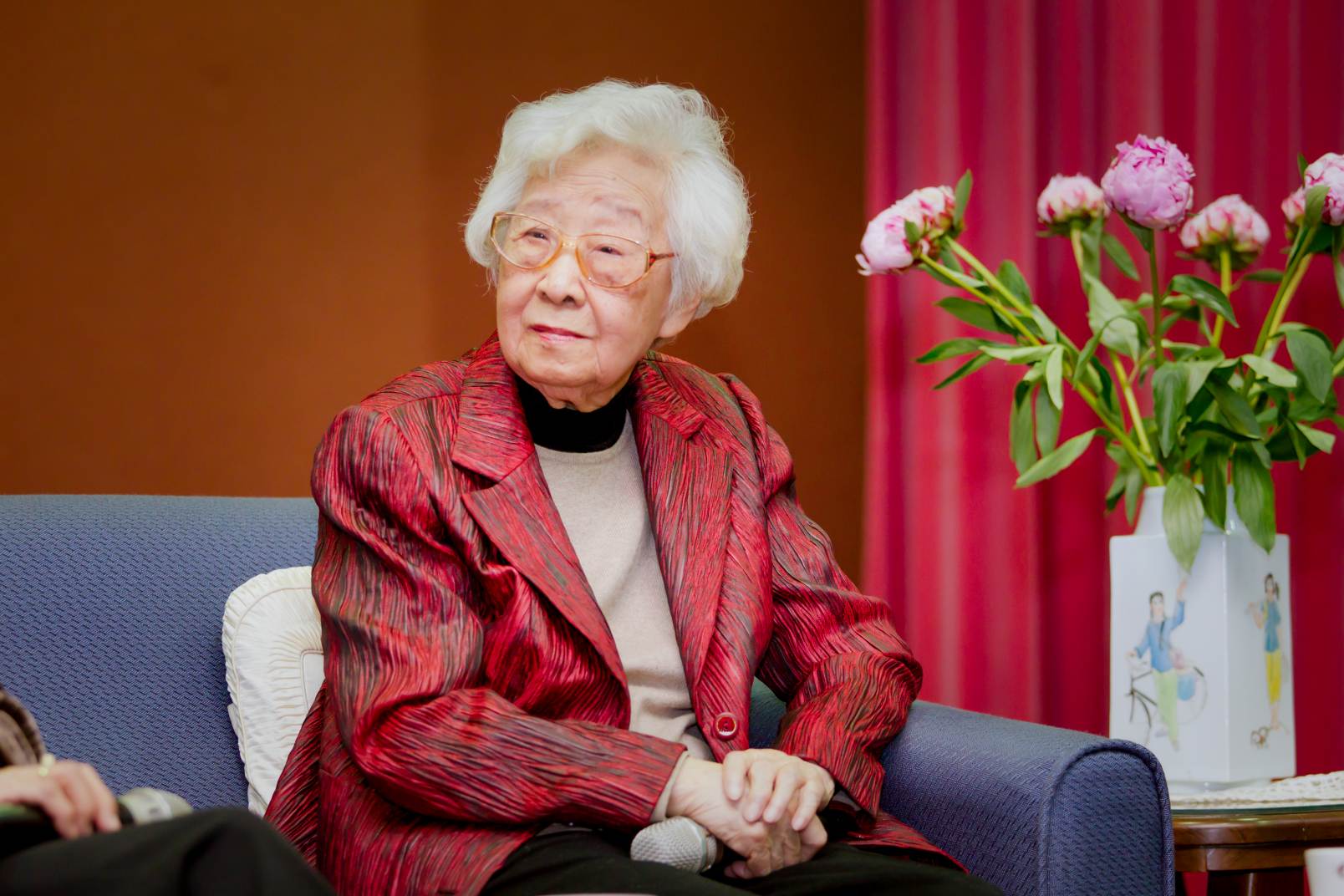Chi Pang-yuan: Emissary of Taiwanese literature, daughter of the Republic of China

Source:Chien-Ying Chiu
Chi Pang-yuan, a literary pioneer renowned for her depictions of the Chinese people’s hardships, diaspora, and determination in the 20th century, has passed away at the age of 101. Now is a good time to look back at the cultural legacy she left for Taiwan.
Views
Chi Pang-yuan: Emissary of Taiwanese literature, daughter of the Republic of China
By Ruowen Liweb only
On March 29th, 2024, nearly eight decades after she relocated to Taiwan, the great author Chi Pang-yuan (齊邦媛) passed away at the age of 101.
She was most known for her memoir, "The Great Flowing River". She represented the last generation of waishengren who lived through both the Second Sino-Japanese War and the Chinese Civil War.
Chi was born into a military family in Liaoning in 1924. Her grandfather served under the Manchurian warlord Zhang Zuolin. Her father, Chi Shiying (齊世英), studied in Germany and Japan in his youth. He founded schools in China and participated in the defense against Japanese incursions in Northeast China.
She grew up in war and strife. In 1930, her family settled in the then-capital of Nanjing. But in 1937, at the outset of the Second Sino-Japanese War, 13-year-old Chi fled her home with her parents just ahead of the Nanjing Massacre.
She witnessed first-hand the horrors of war. Hundreds of thousands of Nanjing residents fought to squeeze into the train station and escape the city. Terror and panic ruled the day. The Chis managed to get a seat on-board, but others clambered onto the roof of the train. Nothing the conductors shouted at them could convince anyone to disembark.
The train left the station. Eventually, it reached a tunnel. Chi heard screams outside her window. People on the roof were being knocked onto the tracks, but there was nothing anyone inside could do.
It was a journey through hell. Chi's mother had given birth not long ago and her bleeding would not stop. They used up all their blankets trying to use them as bandages. Chi's baby sister, who was only a year and a half old, did not survive the exodus.
Chi said that half a century later, the screams she heard on that train—the wailing of China and her people—still haunted her dreams on countless nights.
Chi's experiences during the war helped to build her independent, resilient, and forceful character.
A window into Taiwanese literature
 Chi Pang-yuan (齊邦媛) passed away at the age of 101. (Photo: Chien-Ying Chiu)
Chi Pang-yuan (齊邦媛) passed away at the age of 101. (Photo: Chien-Ying Chiu)
In 1947, Chi completed her degree in English literature at Wuhan University. She was invited by famed geologist Ting-Ying Ma (馬廷英) to come to Taiwan and become a teaching assistant at the Department of Foreign Languages and Literature at National Taiwan University.
Chi's father bought a round-trip plane ticket for his daughter, never imagining that she would spend the rest of her life in Taiwan.
Soon after her arrival in Taiwan, Chi married Wuhan University alumnus Luo Yuchang (羅裕昌). In 1949, the Kuomintang government retreated to Taiwan. There was no longer any question of returning to China. The couple settled down and had three sons.
Thus did Chi begin her career as a teacher on the island, which would span over three decades. She taught English for three years at Taichung First Senior High School, and then she taught at National Chung Hsing University (NCHU).
Her husband worked at Taiwan Railway and was often called away when typhoons or floods disrupted rail service. Chi was left with the lion's share of the housework, but she never gave up on her own education.
In 1967, when she was 44, Chi studied English and Comparative Literature at Indiana University in the United States. Upon her return to Taiwan, she was appointed the first chair of the Department of Foreign Languages and Literature at NCHU. She also helped draft textbooks for the National Institute for Compilation and Translation, drastically increasing the proportion of modern Taiwanese literature in the middle school curriculum.
As an academic, her greatest contribution to Taiwan was introducing Taiwanese literature to the West. She also helped chronicle the timeline and history of Taiwanese literature as a whole.
Her experience in the US taught her that the Western world lacked English documentation about Taiwan and had limited means of learning about Taiwan through literature.
After returning home, Chi gathered a team of translators and invited literary heavyweights such as Yu Kwang-chung (余光中) and Ho Hsin (何欣) to create "An Anthology of Contemporary Chinese Literature" (中國現代文學選集). These became the first Chinese textbooks used in American universities that were written in Taiwan.
In 1992, she became chief editor at the quarterly journal published by the Taipei Chinese PEN. In 1996, she participated in an English translation project spearheaded by the Columbia University Press that introduced the long-form masterpieces of more Taiwanese writers, such as Wu Chuo-liu (吳濁流), Songfen Guo (郭松棻), Huang Chun-ming (黃春明), and Chu T'ien-wen (朱天文) to western audiences.
Never forget the Chinese plight
In 2004, National Taiwan University established its Graduate Institute of Taiwan Literature, and Chi donated an extensive collection of books. To this day, there is a reading room on the premises that is named after her.
In 2005, when she was 81, Chi moved into the retirement village run by the Chang Gung Medical Foundation in Linkou. In that serene and rustic environment, she began writing her memoir, "The Great Flowing River", about her memories of the war she had lived through.
She never forgot her father's abject loneliness and deep sorrow in his later years. The elder Chi's opposition to the Kuomintang's heavy-handed policies after relocating to Taiwan not only cost him his party membership, but also placed him on the watch list of potential dissidents. In his final years, Chi Shiying was prone to weeping when he drank, and he took to endlessly apologizing to the ghosts of the friends he had lost during the war, as well as the Chinese comrades languishing under communist rule across the Strait.
Chi wanted desperately to protect the memory of that generation, of which so much was asked. She did not want the plight and suffering of the Chinese people over the last century to be forgotten.
The memoir she wrote was her magnum opus. It recorded the adversity and diaspora experienced by the Chinese people in the 20th century, as well as the determination they exhibited in the face of such difficulties.
"The Great Flowing River" is a rare modern masterpiece. It has been translated into English, Japanese, German, and many other languages.
In 2009, Chi was honored with a Presidential Culture Award. In 2015, she won the National Culture Award. In 2019, the president of Indiana University came to Taiwan to present her with an Honorary Doctor of Letters to make up for the fact that her preoccupation with her family prevented her from attaining her degree all those years ago.
Unseen but not unsung
Chi's husband Luo Yuchang worked at Taiwan Railway for almost four decades. He rose from the ranks to become deputy director, and he was instrumental to the modernization of Taiwan's trains and the introduction of electric locomotives.
Unfortunately, Luo suffered from an ear disease that he neglected to treat due to his dedication to his job. His hearing worsened until he was practically deaf in his old age, so that he "spoke" with his wife through writing. He died in 2012.
To this day, his name can be found on the monument commemorating the massive project that moved the modern Taipei Main Station underground. And "The Great Flowing River" is still to be found in bookstores, bookshelves, and libraries around the world.
The hardships and sacrifices of the greatest generation may be in the past, but their contributions to our world will never be forgotten.
Have you read?
- Yuan Yung-cheng: Taiwan’s first soccer pro in Europe
- How golf champion Yani Tseng faced her inner demons
- Pushing the envelope: Producer Derrick Sepnio on his journey In Mandopop
Translated by Jack Chou
Edited by TC Lin
Uploaded by Ian Huang






